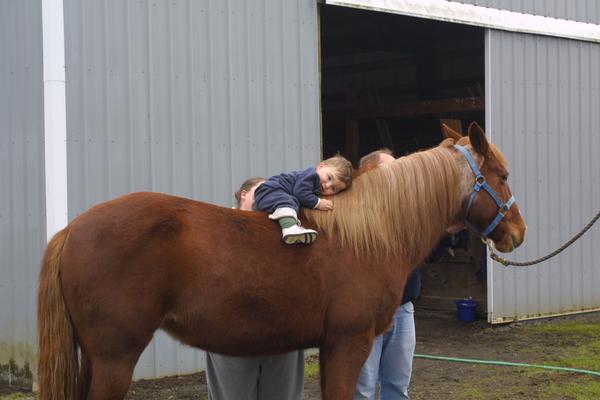RamblingCowgirl
Loving the herd life
My family has two old girls, a soon to be 24yo BLM Mustang who is 1/4 or 1/2 draft {a Belgian stud was loose on the rage for a while} and a 20yo mini/shetland cross. Last time I looked on line I could not find much useful info. The have hay all the time an okay grass mix {hay was hard to find this year}, mineral block, utd on wormer. The feed we are useing is a 14% protien, 4% fat all around horse pellet. Glory the mustang also gets alfalfa cubes twice a day...I'm gussing around 1lb dry per feeding. She gets a 38 oz coffee can full of pellets. She always looks bony, but over the spring/summer/fall she never felt it. Now she does.
Farrah is a bit more tricky, she has/is a founder and could be in foal...would be due in mid may I think. I'm always thinking in the back of my mind don't over feed her I think she could use just a bit more of something tho, she looks just a bit rough just enough to make me wounder is she need something more. But I have never been able to find anything about feeding an old, pergo, pony, so it really been a guessing game.
When she had her foal last year I had her on mare & foal feed, and a mare & foal suplament...she was putting away almost as much feed a Glory is getting now. I have no plans to breed her any more. Just let her live out her days. I have had her from the time she was two. This last foal is a nice looking colt, grew like a weed. If she is in foal again I'll mix in mare & foal feed in the next few months, and increase the volume like I did befor.
But for Glory I was thinking of changing out alfalfa pellets for the cubes, or add pellets and increase the volume over all....or should she be on strait alfalfa pellets only? I'm really not sure. We are all also on a tite budget, so things have to stay rather basic.
I'd also like some basic info on feeding older horses, we have two soon to be retired brood mares in there mid-late teens.
Thanks for any help
ETA I'd put Glory at a 3 on the horse body condition score, and Farrah a 4
Farrah is a bit more tricky, she has/is a founder and could be in foal...would be due in mid may I think. I'm always thinking in the back of my mind don't over feed her I think she could use just a bit more of something tho, she looks just a bit rough just enough to make me wounder is she need something more. But I have never been able to find anything about feeding an old, pergo, pony, so it really been a guessing game.
When she had her foal last year I had her on mare & foal feed, and a mare & foal suplament...she was putting away almost as much feed a Glory is getting now. I have no plans to breed her any more. Just let her live out her days. I have had her from the time she was two. This last foal is a nice looking colt, grew like a weed. If she is in foal again I'll mix in mare & foal feed in the next few months, and increase the volume like I did befor.
But for Glory I was thinking of changing out alfalfa pellets for the cubes, or add pellets and increase the volume over all....or should she be on strait alfalfa pellets only? I'm really not sure. We are all also on a tite budget, so things have to stay rather basic.
I'd also like some basic info on feeding older horses, we have two soon to be retired brood mares in there mid-late teens.
Thanks for any help
ETA I'd put Glory at a 3 on the horse body condition score, and Farrah a 4

